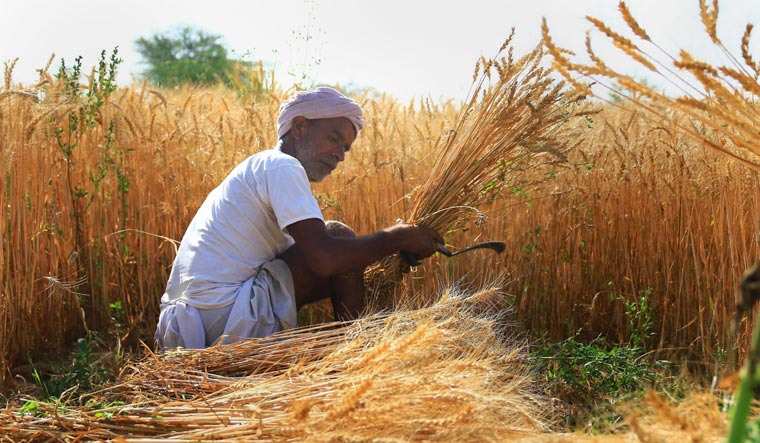
Even as the nationwide lockdown is set to be extended, the two main agrarian states, Punjab and Haryana, are set to begin the challenging exercise of wheat procurement, keeping social-distancing norms in mind. The harvest and procurement of the Rabi crop, primarily wheat and mustard, is set to start from April 15.
The country already has a bumper crop and the states expect to increase their procurement this time. The issue had come up during discussion between Prime Minister Narendra Modi with state chief ministers, where the states informed Modi on measures they have put in place to start procurement.
Modi suggested that direct marketing for farm produce can be incentivised to prevent crowding in mandis. The government has suggested that the APMC laws should be amended, so that farmers can sell their produce to anyone, and not just the government-authorised mandis. The state government may sidestep the APMC laws for next three months till the procurement is over by end of June. What the prime minister meant by incentivising the farmers was to pay them little extra to delay bringing their produce to the market.
Coupled with shortage of farm labourers, the procurement will test the arrangements of the state governments so that no crowding occurs at the mandis. Both Punjab and Haryana have introduced a system of issuing passes to access mandis. In Punjab, the wheat procurement will start on April 15, while in Haryana, it will start on April 20.
In Punjab, the elaborate arrangements include police and security personnel at mandis. Only those farmers with valid coupons will be allowed entry to stop crowding.
Punjab has over 17,500 harvest machines to do the work, of which many had gone to neighbouring states for harvest and are set to return before procurement starts after Vaisakhi. The government is also setting up 30-member call centres in all districts to engage with farmers.
Punjab hopes to procure 137 lakh metric tonnes (of which 135 lakh metric tonnes will be for government agencies) of wheat this year, an increase from 130 LMT last year. It has set up over 3,700 procurement centres in 22 districts.
The Haryana government has set up close to 2,000 procurement centres, up from 377 last year.
The Punjab government claims that it has availability of over 14 lakh farm labourers as they were able to stop them as curfew was imposed much in advance. In 12,730 villages, there were over 10 lakh workers in the age group of 18-46 years, while another four lakh are above 46 years.
In another innovation, the Centre intends to have a truck aggregator service on the lines of taxi service Uber. This facility has been launched on e-NAM platform through which more than 7.76 lakh trucks and 1.92 lakh transporters are linked.
As India had a good crop of wheat, the government will be exporting 90,000 metric tonnes to Afghanistan and Lebanon.
The government has already relaxed lockdown conditions for the movement of major products such as rice, groundnut, processed food, meat, poultry, dairy and organic products. Their exports have also begun. The Railways introduced 67 routes for running 236 parcel special services to supply essential commodities including perishable horticultural produce, agricultural inputs, milk and dairy products.
The Union agriculture ministry will have a national meeting for the next Kharif crop on April 16. Meanwhile, according to the government statistics, the sowing of the summer crops has progressed “satisfactorily.”
As of April 10, the total area under the summer crops (including rice, pulses, coarse cereals and oil seeds) cultivation has jumped significantly, registering 11.64 lakh hectare increase over the last year, overcoming the restrictions and social distancing norms witnessed since last month.
“As against a total cultivated area of 37.12 lakh ha in the year 2018-19, the summer crops have been sown in an area of 48.76 lakh ha this year (2019-20). The normal area of corresponding week in the last year was 41.81 lakh ha as on 10th April,” a government note said.
The government says under the PM-KISAN scheme during the lockdown period from 24.3.2020, about 7.77 crore farmer families have been benefitted and an amount of Rs. 15,531 crore has been released so far.
The industry bodies also welcomed state governments’ decision to relax norms for allowing harvest. “As the Rabi harvest is picking up, necessitating the workforce to be in the fields along with agri machinery, it is imperative to facilitate the most important activity, which has provided food security to the country. It is India’s lifeline, giving livelihood to over half of our population. This sector certainly needs the maximum of the national resources and commitment. It is good to see several states responding very well to the sector,” ASSOCHAM secretary general Deepak Sood said.